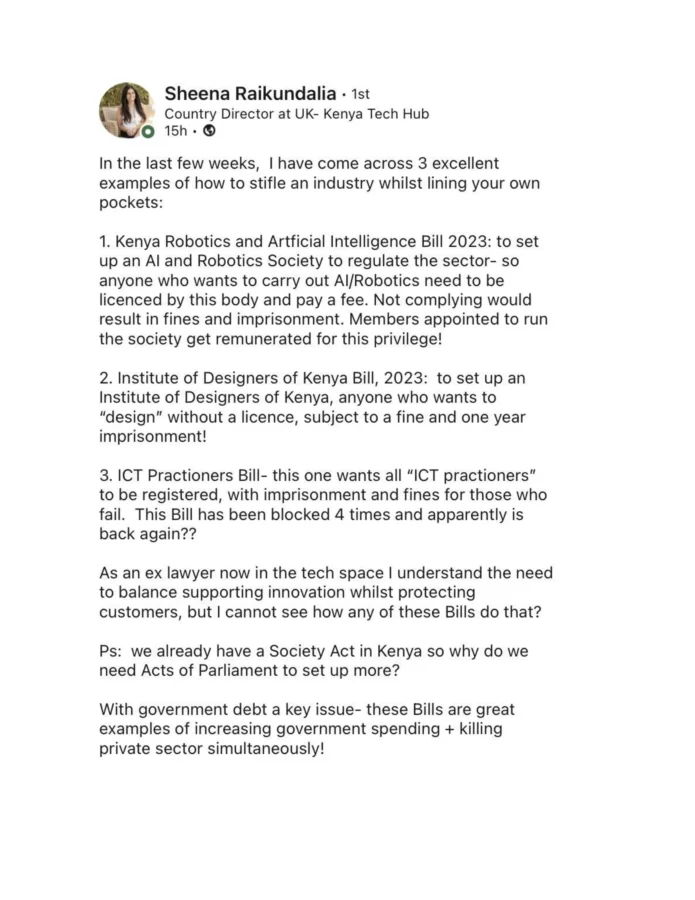Kenya, a country with a rapidly growing technology sector, has recently seen the introduction and passage of several bills aimed at regulating key industries. Sheena Raikundalia, a seasoned professional with extensive experience in the legal, financial services, and impact investment sectors, shared her perspective on these bills and their potential impact on innovation and private sector growth.
Kenya Robotics and Artificial Intelligence Bill 2023
The Kenya Robotics and Artificial Intelligence Bill 2023 has stirred both support and criticism. Proponents argue that it provides a necessary legal framework for the evolving AI and robotics field, protecting consumers and encouraging responsible use.
Critics, however, express concerns that excessive regulation might stifle innovation and deter startups and entrepreneurs from entering the sector. The challenge lies in finding a balance that fosters innovation while ensuring responsible development.

Institute of Designers of Kenya Bill 2023
The Institute of Designers of Kenya Bill, 2023, seeks to establish a regulatory body to oversee design-related activities. Individuals practicing design without a license could face fines and imprisonment.
The implications of such regulation remain a subject of debate, particularly regarding how it will impact the design industry and the freedom of creative professionals.
ICT Practitioners Bill
The ICT Practitioners Bill, a proposal initially introduced in 2016, aimed to mandate the registration and licensing of ICT practitioners, potentially impacting a wide range of tech professionals.
In 2016, Kenya introduced the ICT Practitioners Bill, a comprehensive regulatory framework championed by Aden Duale and supported by MP Godfrey Osotsi. The bill aimed to govern “ICT practitioners” and mandated university education, three years of relevant experience, annual licensing fees, and penalties for non-compliance.
The tech community strongly opposed the bill, fearing it would stifle innovation and deter young talents from online jobs and education. Joseph Mucheru, then Cabinet Secretary of Kenya’s Ministry of Information and Computer Technology, rejected the proposal, citing concerns about its potential to hinder innovation.
Read Also: Finance Bill 2023 Given the Green Light by National Assembly
In 2018, the bill resurfaced with an amendment, removing the university degree requirement, and giving the proposed ICT Practitioners Council the authority to determine registrations. This change sought to address the innovation vs. regulation balance.
Raikundalia questions whether these amendments strike the right balance between innovation and regulation, highlighting concerns about their potential impact on the private sector and government spending.
As an individual with a legal background transitioning into the tech space, Sheena Raikundalia appreciates the importance of balancing innovation and consumer protection. However, she raises valid questions about how these bills contribute to achieving that balance.
The recent regulatory bills in Kenya highlight the ongoing debate between the need for legal frameworks to support evolving industries and the potential unintended consequences, such as stifling innovation or increasing government spending.
Subscribe to Switch TV for more content.
The challenge for policymakers is to create regulations that encourage responsible development while fostering private sector growth and innovation.
















